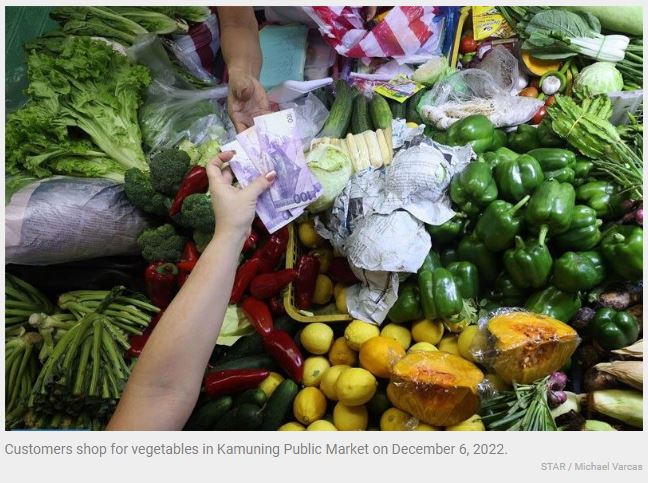Philippines: Inflation sprints to 8% in November
Fastest in 14 years
MANILA, Philippines — Inflation rose to a 14 year-high in November largely due to faster food price upticks, the Philippine Statistics Authority (PSA) reported yesterday.
In a briefing, deputy national statistician Divina Gracia del Prado said headline inflation – the rate of increase in prices of consumer goods and services – rose to eight percent in November from 7.7 percent in October.
It is also much faster than the 3.7 percent rate in November last year.
Del Prado said the November inflation rate was within the Bangko Sentral ng Pilipinas’ forecast of 7.4 to 8.2 percent for the month.
“This inflation (rate) is the highest since November 2008. We had (an inflation rate of) 9.1 percent in November 2008,” Del Prado said, pointing out that the global financial crisis during that time affected prices.
“But if you look at the whole series, the highest was in January 1999 when 10.7 percent was our inflation at the time,” she said.
The latest inflation reading brought the average for the January to November period to 5.6 percent.
Del Prado said the higher inflation rate in November was driven by the faster increase in food and non-alcoholic beverage prices, which rose to 10 percent in November from 9.4 percent in October.
Contributing to the higher inflation of the food and non-alcoholic beverages index are vegetables and tubers; rice; and sugar, confectionery and desserts.
Also driving the uptrend in inflation was the higher increase in the index of restaurants and accommodation services at 6.5 percent in November from 5.7 percent in October.
She said another contributor to the higher inflation rate in November was the furnishings, household equipment and routine household maintenance index as it climbed to 4.5 percent in November from 3.8 percent in October.
Commenting on the latest data, Nicholas Mapa, senior economist at ING Bank in Manila, said inflation continued to accelerate due largely to higher food prices as storm damage caused supply disruptions.
“Moderating global energy prices helped lower utilities and transport costs, but the hefty food sub-sector was enough to drag the headline number higher,” he said.
“Meanwhile, demand side pressure remained persistent, with inflation for revenge spending-related items ticking higher,” Mapa said.
He said inflation is further expected to peak this month.
For the country to hit the revised inflation assumption of the Development Budget Coordination Committee (DBCC) at 5.8 percent for the year, Del Prado said the inflation rate in December should not go beyond 8.5 percent.
The DBCC raised its inflation assumption to 5.8 percent for this year from a range of 4.5 to 5.5 percent previously, as food and transport costs remained high.
To alleviate the impact of higher prices particularly to the vulnerable sectors and low-income earners, Socioeconomic Planning Secretary Arsenio Balisacan said the government would continue to implement targeted subsidies and discounts.
“To ease price pressures, we continue to implement measures to boost food production and reduce the cost of bringing farm produce to the market,” he said.
While the government is providing assistance particularly to vulnerable groups, he said there is a need to improve its delivery to make sure it gets to the targeted beneficiary in a timely manner.
“The digitalization effort of the government will help make this happen, which is part of the cross-cutting strategies identified in the Philippine Development Plan for 2023-2028,” he said.
Source: https://www.philstar.com/business/2022/12/07/2229023/inflation-sprints-8-november


 Thailand
Thailand




